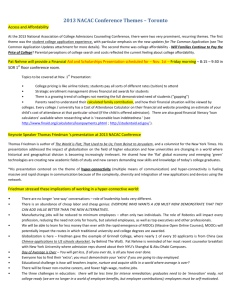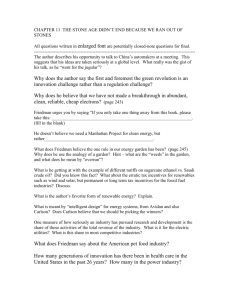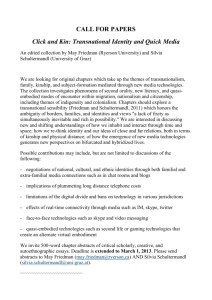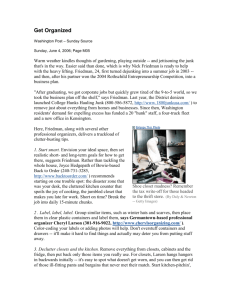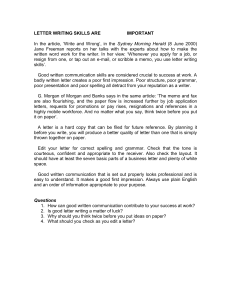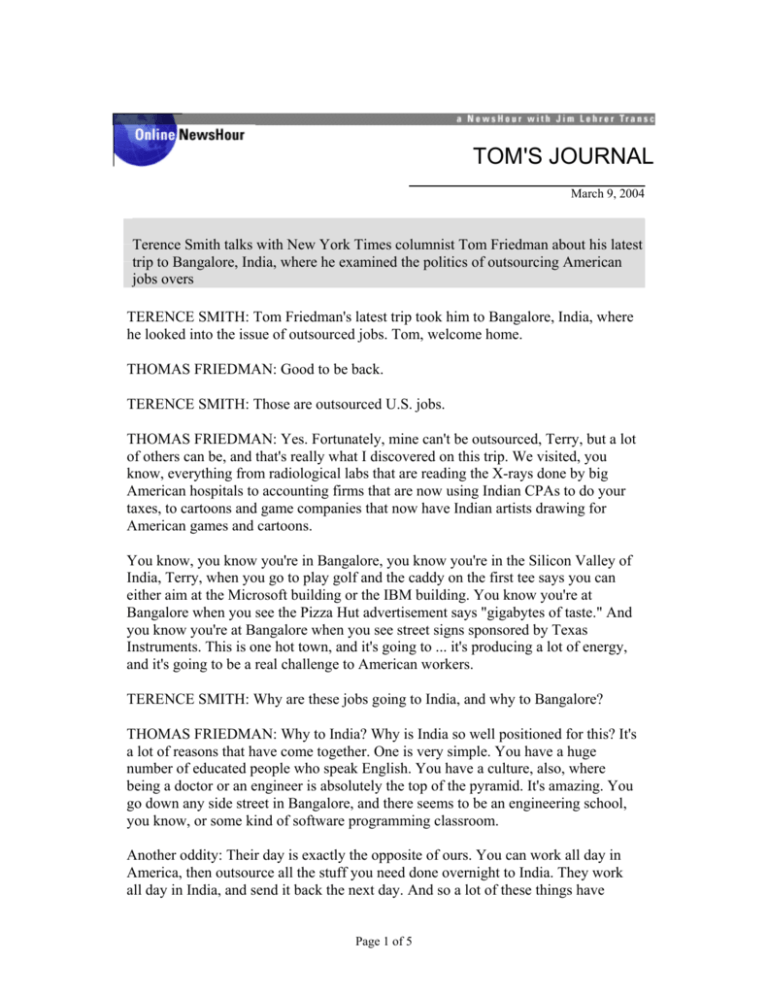
TOM'S JOURNAL
March 9, 2004
Terence Smith talks with New York Times columnist Tom Friedman about his latest
trip to Bangalore, India, where he examined the politics of outsourcing American
jobs overs
TERENCE SMITH: Tom Friedman's latest trip took him to Bangalore, India, where
he looked into the issue of outsourced jobs. Tom, welcome home.
THOMAS FRIEDMAN: Good to be back.
TERENCE SMITH: Those are outsourced U.S. jobs.
THOMAS FRIEDMAN: Yes. Fortunately, mine can't be outsourced, Terry, but a lot
of others can be, and that's really what I discovered on this trip. We visited, you
know, everything from radiological labs that are reading the X-rays done by big
American hospitals to accounting firms that are now using Indian CPAs to do your
taxes, to cartoons and game companies that now have Indian artists drawing for
American games and cartoons.
You know, you know you're in Bangalore, you know you're in the Silicon Valley of
India, Terry, when you go to play golf and the caddy on the first tee says you can
either aim at the Microsoft building or the IBM building. You know you're at
Bangalore when you see the Pizza Hut advertisement says "gigabytes of taste." And
you know you're at Bangalore when you see street signs sponsored by Texas
Instruments. This is one hot town, and it's going to ... it's producing a lot of energy,
and it's going to be a real challenge to American workers.
TERENCE SMITH: Why are these jobs going to India, and why to Bangalore?
THOMAS FRIEDMAN: Why to India? Why is India so well positioned for this? It's
a lot of reasons that have come together. One is very simple. You have a huge
number of educated people who speak English. You have a culture, also, where
being a doctor or an engineer is absolutely the top of the pyramid. It's amazing. You
go down any side street in Bangalore, and there seems to be an engineering school,
you know, or some kind of software programming classroom.
Another oddity: Their day is exactly the opposite of ours. You can work all day in
America, then outsource all the stuff you need done overnight to India. They work
all day in India, and send it back the next day. And so a lot of these things have
Page 1 of 5
converged. And then there's a couple of just accidents, Terry.
One is the dot-com bubble and huge overinvestment in dot-com stocks in America.
You know what it did? It laid all these pipes, these fiber optic cables around the
world, and created all this excess capacity, which made it easy -- not only easy,
almost cost-free -- to transmit data from America to India. And then there was
something called Y2K.
Y2K comes along, and you need all these software programmers basically to go
through code, to see if the date is going to be a problem in whatever software
program you're running. Well, what country in the world had that many
programmers easily available, cheaply available? And once the Indians did that, they
said, by the way, could we do this for you? Maybe you'd like your taxes done also.
TERENCE SMITH: You mentioned that they speak English, and yet they have a
wonderful little phenomenon there that you wrote about called the "accent
neutralization class." What's going on there?
THOMAS FRIEDMAN: Accent neutralization class is very popular in Bangalore
today, you know, because you have all ... a whole less sort of sophisticated side of
this phenomenon are the call centers. Young men and women basically selling credit
cards, tracing your lost luggage on Delta Airlines, and also providing tech support
for big American computer companies from IBM to Microsoft and whatnot.
Well, these are all put together in these call centers and when you pick up the phone
and dial that tech number, a young Indian answers. But they want to make sure that
you're going to understand their accent so they teach them or put them through
accent neutralization courses where they learn to roll their R's and to soften their T's.
TERENCE SMITH: We have, in fact, a tape which you've brought back, shot by
New York Times television, for a documentary you're working on what will appear
on the Discovery Channel with a little clip of what goes on in an accent
neutralization class. So let's take a look at it.
INSTRUCTOR: All right, class. I want you to take out your books and I'm going to
give you a passage. Remember, the first day I told you that the Americans flat the
"tuh" sound. You know, it sounds like an almost "duh" sound, not keep it crisp and
clear like the British. So I would not say "Betsy bought a bit of better butter" or
"insert a quarter in a meter." But they would say "insert a quarder in the meder," or
"'Beddy bought a bit of bedder budder."
So I'm just going to read it out for you once, and then we'll read it together. All
right? "Thirty little turtles in a bottle of bottled water. A bottle of bottled water held
30 little turtles. It didn't matter that each turtle had a round metal ladle in order to get
a little bit of noodles." All right, who's going to read first?
Page 2 of 5
MAN: Thirty little turtles in a bottle of bottled water.
WOMAN: A bottle of bottled water held 30 little turtles.
MAN: It didn't matter that each turtle had a rattle ... a metal ladle.
MAN: In order to get a little bit of noodles, our total delicacy.
MAN: The problem was that they were ... sorry.
MAN: The turtle ... the little turtles are always lost because every time they thought
about grappling with a....
INSTRUCTOR: Grappling.
MAN: Grappling with a haggler of turtles.
WOMAN: Grappling with a haggler of turtles, their little turtle minds boggled, and
they only caught a little bit of noodle.
SPOKESPERSON: Good. Very good. ( Applause )
TERENCE SMITH: That looks like fun, for one thing, and yet the teacher had ...
really had the accent down.
THOMAS FRIEDMAN: She had it down. She also does British accents, American
accents. That was actually for a Canadian call center. They were actually working on
a sort of flat North American Canadian accent. And while, you know, the whole
thing is fun to watch, there's also something serious behind it, Terry, because if you
looked at that class, most of them are women.
These are young college grads, most of these kids, who aren't engineers. They could
never get jobs, not for $200 to $300 a month, which is the starting pay in a call
center without this opportunity. And what this has given them is really a chance to
grab the first rung of the ladder. A lot of them on the side are studying for MBAs or
other college degrees. Some of them are now supporting their family. Many of them,
their starting salary is more than their parents' retiring salary.
TERENCE SMITH: But what do you say, Tom, having made this trip, to the
American whose job, the equivalent job, has been lost to the airline ticket counter
agent who is out of work?
THOMAS FRIEDMAN: I mean, it's a very serious question. And I think one can
only say two things. One is that there is simply no question that outsourcing our, you
know, commodity jobs through places like India or grunt work functions that tend to
be low-prestige, low-paying here and become high-prestige, high-paying there is, at
Page 3 of 5
the macro sense, good for our economy, because what it allows us to do is focus on
what we do best, which is innovation. That's the macro answer.
But my micro answer is, I feel your pain. I think we as a society have an obligation
to public policy and tax programs and subsidies and wage insurance and health care
to find a way to cushion people who are in white collar jobs, just as we did -- or tried
to, to some extent -- with blue collar, so they are not going to get steamrolled by this
phenomena. We're talking about 4 million jobs that will be outsourced to India
probably over the next ten years. And that's not an insignificant number.
Now, many more will be lost to technological change, whatever, but I think we have
to take it seriously with a real public policy response, but what we must not do,
Terry, is put up walls that will slow us down and deprive us of what we do best,
which is to come up with new ideas, bring them to market, and sell them to the rest
of the world.
TERENCE SMITH: You were there at a time, just recently, at a time when there is a
real rapprochement between India and Pakistan settling some very long-standing
differences, or working on it anyway. Is it related to the economic uplift of all these
jobs?
THOMAS FRIEDMAN: Directly related, because India now is part of a global
supply chain. These American companies -- GE, Microsoft, American Express -have moved parts of their back rooms to India, to Bangalore. Now, comes along the
India-Pakistan crisis -- I'll tell you exactly what happened. These American
companies got on the phone and told their Indian back rooms, "Friends, we're going
to have to look for an alternative for you. You don't want us to be looking for an
alternative, and we don't want to be looking for an alternative."
When you're part of a global supply chain like that, you can't say, "Oh, we're going
to take a week off to fight a war. We'll see you." You will shut down whole major
corporations. Well, that has percolated up. And what's most interesting to the Indian
leadership -- and this is definitely driving the rapprochement -- it's also got the
Pakistanis looking, saying, "Jeez, the Indians, they're doing well at this. And what
are we? We're just like them, too."
But even more, Terry, you know, you talk to these young kids like in that accent
neutralization class, I would ask them all, "So what do you think of the Pakistan
crisis?" "Oh, forget about it. We've got better things to do." And that's where, you
know, this cease-fire brought to you not by General Powell, but by General Electric.
We bring good things to life. So there is a geopolitical spin-off to this that we also
have to keep in mind.
TERENCE SMITH: Tom Friedman, terrific as always. Thank you.
THOMAS FRIEDMAN: Pleasure.
Page 4 of 5
Copyright ©2005 MacNeil/Lehrer Productions. All Rights Reserved.
Page 5 of 5


